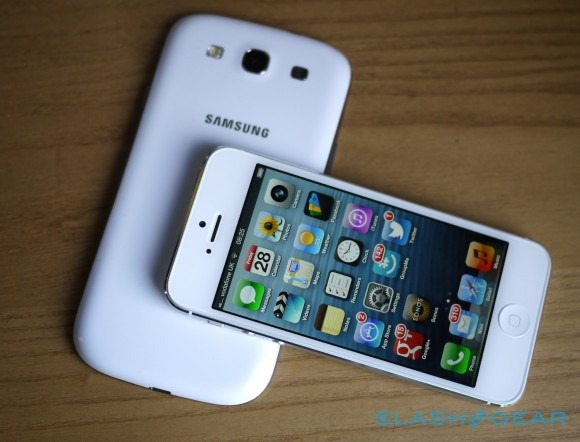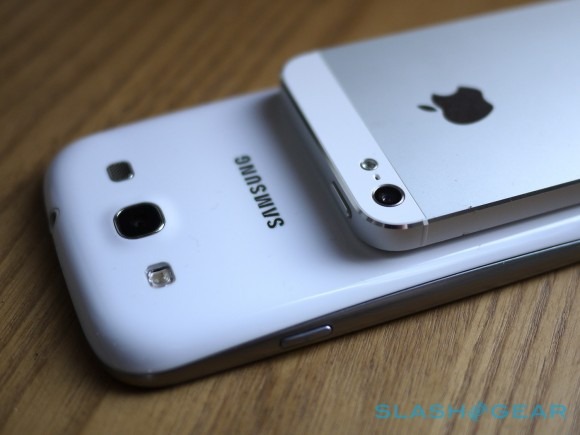That iPhone 5 appeal (or, confessions of a swayed Galaxy S III owner)
I'm an Android user. I love my Samsung Galaxy S III. So why am I punching my details into the iPhone 5 reservation site every day? For the past week or so I've been using a borrowed iPhone 5, tracking how it holds up – and where it falls short – to the Android experience I've grown accustomed to. During that time I've been frustrated by Maps, impressed by the camera, and generally had my expectations of iOS shaken up some. It's always good to mix up the status-quo every so often, too, and along the way remember that there's more than one way to skin a metaphorical cellular cat.
Vincent's already comprehensively reviewed the iPhone 5, so I won't retread old ground where it's not necessary. Suffice to say, the general reviewer consensus is that it's the best iPhone to-date, and Apple's announced sales figures certainly suggest that the buying public agrees.
As I've said before, I split my geek life mainly between Android and Apple. I use a MacBook and I have a new iPad, but I also use a Nexus 7 and my regular phone is a Galaxy S III. I love OS X for its simplicity (and I love the new Retina MacBook Pro for its build quality, excellent display, and design) but I've had mixed results with iOS. The limits on things like inter-app sharing are a frustration in comparison to Android, and Apple's comparatively locked down ecosystem overall – though making for a very consistent user-experience – have left me feeling more at home with Google's platform.

The iPhone 5 is the first Apple handset that has made me consider switching, however. Part of that is the industrial design; while there are many people disappointed that Apple has ditched the glass back panel of the 4/4S, I much prefer the crisp metal of the newest model. It's a device which you simply must hold in order to appreciate: the perfect alignment and slick finish (assuming yours didn't get scratched up in transit), and the balance of lightweight feel yet a phone which still feels solid in your hand.
[aquote]The 4-inch screen instantly feels correct[/aquote]
Even though it's been stretched out in comparison to its predecessors, the 4-inch screen and the longer form-factor instantly feel correct. The old iPhone looks squat and blunted in comparison now. It's not just an aesthetic boon, though, and flipping between the iPhone 5 and the Galaxy S III, I was struck by just how large and, occasionally, unwieldy the Samsung's sizable screen is. Conversely, there were times where I was browsing, and the iPhone 5 still felt cramped when viewing full sites where the same content looked bright, readable, and bold on the Galaxy S III.
Nothing prepares you for how tactile the iPhone 5 is, however. I found myself picking it up and toying with it – automatically reaching for it when I was in-between writing articles, for instance, or just while watching TV. Not even necessarily turning it on, though the quality of the display and the smoothness of iOS 6 makes flicking through apps a somewhat mesmerizing experience. The simple cohesiveness and immediacy of the UI animations is enough to convince you that there's a lot to be said for perfectly matching homegrown software with homegrown silicon, as Apple has done with iOS and the A6 chipset.
Still, iOS 6 isn't all good. The "over 200 new features" Apple has touted of the latest release is an eye-catching figure, certainly, but in practice it's tough to identify more than a couple of changes over previous versions. Some of those, like the switch from Google Maps to Apple's version, are effectively a step backwards, too. The learning curve for existing users is small, then, for the iPhone 5, but the platform is also beginning to feel tired and maybe even stagnant. Why can I share photos via email or Twitter from the gallery, but not Google+? Why is there no "new email" notification when the phone is locked, despite most other apps getting the opportunity to slot alerts onto the lockscreen? Why, if even Apple admits that Maps isn't ideal, can I not set a third-party alternative as the default for opening addresses?
iOS helped pave the way for a more user-friendly breed of mobile devices, but in many ways Android and Windows Phone have surpassed it in imagination. Part of that might be Apple's reluctance to leave anybody behind along the way: as Jony Ive said of the iPhone 5 design changes, Apple didn't want to evolve the appearance of the smartphone simply for the sake of doing so. There's certainly something to be said for familiarity and sticking with what works, but there's a faint whiff of laziness around Apple's approach: a sense of "why do too much when people will buy it in droves anyway."
Maybe that's unduly cynical, and what new features do stand-out are generally solid. The panoramic photo system may not be the first such example in a smartphone, but the quality of the final shots is highly impressive. Put Siri – finally becoming of some use outside of the US with the recent functional additions – next to Samsung's S Voice and the clunkiness of the Galaxy S III's system is obvious. I've not had a chance to try LTE – I was using Vodafone's network, still on 3G here in the UK as there's no commercial 4G service to be had – but battery life proved impressively lengthy.

Maps, then, is the fly in the ointment, and though US-based reviewers have had less of a struggle, outside of the US the situation seems considerably worse. Dodgy data is only part of it, though; Apple may have added turn-by-turn navigation, and I can do without Street View, but the absence of public transport directions is, for a city-dweller without a car like myself, a deal-breaker. I'm not the only one, either. Over the past week I've spoken to confused tourists and frustrated cab drivers, none of whom have been particularly impressed with Apple's own mapping tool.
[aquote]Apple has the opportunity to do something interesting in the location space[/aquote]
Maps will undoubtedly improve – and I do believe that Apple has the opportunity to do something genuinely interesting in the location space, though a combination of gamification and crowdsourcing, and in the process refine its data considerably – but it will have left a lot of users with burnt fingers and lingering suspicions of the native app. Those days I didn't double up and bring the Samsung with me too, I relied on the excellent Nokia Maps in the browser (with a homescreen shortcut so as to pretend as much as possible that it was a native app).
So why am I considering buying an iPhone 5? Put simply, it's faults can be addressed with software tweaks – invisibly on the server-side, in the case of Maps, so that for users the experience simply gets better – and its strengths, such as build quality, design, camera capabilities, and battery life, are all undeniable. Plus there's a whole lot to be said for phones with top-spec components but with more mid-scale displays: 4-inches is a sweet spot that's overlooked by rival flagships, and usually if you want a handset of a similar size, you have to make do with lower resolution screen hardware, underwhelming specifications, or mediocre aesthetics. Huge displays are eye-catching, certainly, and they do make things like browsing far more immersive, but they come with compromises too.
Question is, will I be carrying the iPhone 5 alone, or will it have to share my attentions with the Galaxy S III? The likelihood is that I'll be relying on two devices; I'm also considering pairing iPhone 5 and the Nexus 7, though even at 7-inches the Google tablet is less than ideal for bag-less travel. So, two phones it is; that makes me an outlier, yes, but that I'd even consider it having been so satisfied with Android until now is evidence of the step forward the iPhone 5 has taken. It's not perfect, but it does enough – and well enough – to finally earn a place in my pocket.
[polldaddy poll=6531422]
